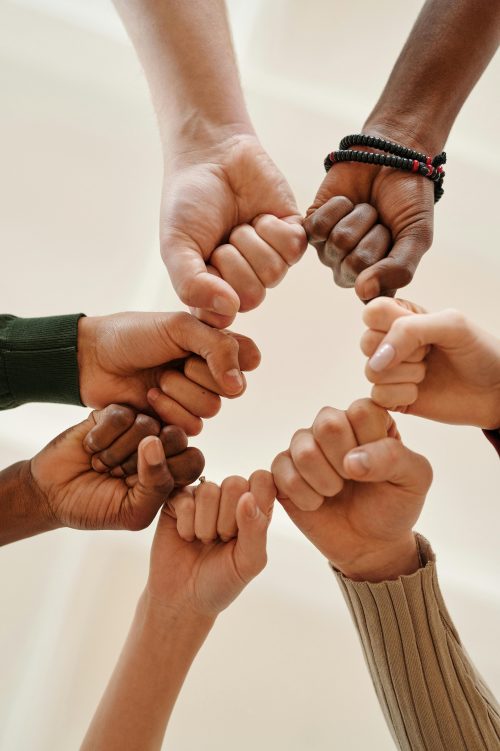As a mixed woman, there’s a strong possibility that you’ve had to deal with overcoming racial bias at some point in your life. Given today’s social and political climate, unfortunately, you still very likely deal with judgments and stereotypes based on your race and gender. The truth is, we’re judged and we judge all the time, even if we don’t realize it. How you cope with these situations can either elevate or devastate you.
Bias is a normal part of being human. However, some implicit biases and stereotypes are harmful to us as mixed women, and to society as a whole. You can’t stop people from judging you, but you can address bias and learn to overcome it.
Everyone deserves the freedom to choose their labels, or no labels at all. You may identify with some of the labels that we’ll talk about in this blog. You may even choose certain labels for yourself that you’re proud of. It’s important to be aware that not everyone identifies with the same labels you do.
Even when you learn to show your true self, you’ll still be open to judgments from others who want to tell you who you should be or how you should live your life. While this will always happen, my hope is that this blog empowers you to push back against harmful stereotypes. You can work toward overcoming racial bias so you can be proud of who you are and not let anyone get in the way.
Let’s talk about the detrimental ways in which racial bias is perpetuated.
Colorism and the Dangerous Nature of Labels
Any label can be harmful, especially when it’s forced upon you. Beyond that, you’re extremely vulnerable while you’re still figuring out who you are. Unfortunately, it’s common for us as mixed girls to hear these labels, even from those closest to us.
Colorism and bias may have been present in your life in different forms. Colorism is a specific type of bias that discriminates against people with darker skin. It’s often prevalent within communities of color. For example, if you’re mixed and live in a black community, people might say or imply that your lighter skin is a good thing one minute and then torment you for it the next.
While the intention behind nicknames and labels may not be to hurt you or make you feel boxed in, that’s often the effect. Maybe your parents or other adult members of your family:
Told you that it’s good to have lighter or darker skin (or made you feel like you’re less valuable if you’re one or the other).
Expressed a desire to look a certain way or talked about their appearance or identity in a self-deprecating way.
Stereotyped others based on their race or appearance.
Although some of these situations may not have involved comments or actions against you specifically, they likely affected the way you view your own identity and race in general.
While colorism and stereotyping can also affect men, mixed women tend to label themselves differently based on their gender experiences. Mixed women often experience judgment and hostility from women who aren’t mixed, which leads to them not identifying as much with that particular race¹.
You may have tried to ignore damaging comments or behavior. Maybe you’ve tried to defend yourself against them. Odds are, no matter how you handled these situations, they made you feel angry, hurt, or confused.
The pressure to conform or choose only one part of your identity isn’t only present in our interactions. Once you become aware of it, you can see it in the way our society functions.
The Pervasiveness of Racial Bias
We’ve all been through the process of choosing our ethnicity or race on government forms. However, not everyone views this as a dividing or frustrating experience. As a mixed girl or woman, these forms might make you feel like you’re ignoring part of your identity.
When you’re looking at these options as a mixed woman, you might feel like there’s no accurate label that encapsulates who you are. More often than not, you have to choose only one part of your identity in these cases.
While you have to go through with processes like this, it’s important to hold on to what you know about yourself.
I consider myself to be many things, but the simple version of my background is “Black” and “Hispanic”. How often do you fill out a form that allows you to choose “Black” without “Non-Hispanic” following it? It’s rare in my experience.
I’m not saying these labels don’t have their place on forms. They play an important role in research. However, it would be easier to process if all forms had several options and didn’t force you to choose only certain parts of your identity.
It may seem like this is only a problem on forms, and it seems like an inconsequential problem. However, I’m bringing this up to draw attention to the big picture. This doesn’t only happen on forms. Individuals who are forced into a box find this playing out in other areas of their lives as well.
The Power of Awareness in Overcoming Racial Bias
Working on yourself and doing some “soul-searching” is one of the best things you can do to become confident and proud of who you are. It’s also a great step for your child if they face challenges with their racial identity.
One study followed a 12-year-old biracial boy who struggled with identity issues stemming from a lack of education and discussions about his African American heritage. After attending therapy, both sides of his family committed to discussing his identity and heritage. They also started going to cultural events. Over the next two years, the boy developed an appreciation for both cultures and started identifying as biracial. His self-esteem, social relationships, and school performance all improved².
As with any individual or societal issue, awareness is the first step in creating a better reality. However, it doesn’t end there.
How to Overcome Racial Bias
How you overcome racial bias must be unique and tailored to your experiences and preferences. Here are some general techniques that have helped me live proudly as my true self.
Start with yourself.
Overcoming this type of pain or frustration starts and ends in the mirror. It’s a process to look at yourself and see your internal and external greatness. Many women often need to seek outside help when affirmations and self-care don’t resolve their feelings toward themselves and their identities.
If you’re sure of yourself, your values, and your identity, what others say won’t be able to threaten your existence.
If you find yourself feeling confined by your identity, you must take the time to give yourself love. This is a process of understanding who you are, learning to embrace your truth, and empowering yourself through self-care and nurturing.
Visualize being freely and loudly yourself.
Imagine what it would be like. Feel the power of embracing your truth and doing the work to evolve in all that you are and can be. I encourage you to work toward being your authentic self so this feeling is normal for you.
No one can dim your light if it’s burning brightly inside you.
Don’t take all the responsibility.
You are responsible for yourself. If you’re living as your true self and someone doesn’t accept you because of your race or culture, that’s their failure to bear.
When we as mixed women live as our true selves, and stand up for ourselves and other mixed women and women of color, we contribute to the collective well-being of our society.
We have a personal stake in overcoming racial bias, but it goes beyond that. Learn to truly accept yourself and extend that acceptance to other women in similar situations.
We all deserve love, respect, and acceptance.
Decide if labels help or hinder you.
Not all labels are harmful. It depends on your preferences and your relationship to your identity. Some people, including women of color, choose the “humanist ideology” so they don’t feel limited to gendered racial stereotypes³.
However, you might embrace certain labels associated with your race or gender because they empower you and help you stay in touch with those parts of your identity.
It’s important to consistently check in with yourself, especially when you’re faced with bias or stereotyping from others. You may align with a certain label at one point but later realize that the label no longer serves you or accurately describes who you are.
If you’re struggling to accept yourself or figure out who you want to be, reach out to me. I’m here for you because I get it. I know what you’re capable of. Overcoming racial bias and feeling confident in your mixed identity is possible for you.
Dr. KayLa N. Allen is an International Motivational Speaker, Thought Leader, Multicultural Women’s Transformational Coach (Diversity and Identity Coaching) – Certified Health and Well-Being Coach (for Women), a Healthcare Leadership Development Consultant, a DEI (Diversity, Equity, and Inclusion) Leader and Coach via Dear Mixed Girl, and an Expert on Shaping Thriving Futures. Learn more about her services and how you can begin your journey through business and personal evolution/personal development by clicking the button below.

